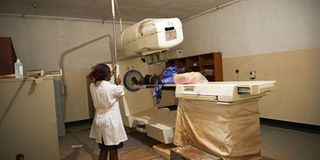You must find time and visit Uganda Cancer Institute

life cannot be the same after visiting UCI. FIL PHOTO
What you need to know:
- It was an eye-opener when I made my first visit there in July 2017 to check on a sick relative.
- There were people from all walks of life with various cancer ailments and an hour spent here can trigger a change in your life.
- The more trips I made to UCI, the more I familiarised with the place, carers and patients there.
- I also got to meet some of the best cancer specialists in the country. Dr Jackson Orem, the UCI director, is one charming person who offered us hope, however grim it was, that the patient would beat the disease.
An old adage says you can never understand the real world until you pay a visit to a prison or hospital. In Uganda, the despair found in those places extends to slum areas, mental facilities and refugee camps. You simply need to visit the Uganda Cancer Institute (UCI) at Mulago to know that there is hell on earth regardless of one’s status, literacy level or financial standing. When cancer reaches a terminal stage, no amount of wealth can save you.
So, it was an eye-opener when I made my first visit there in July 2017 to check on a sick relative. I had been to Mulago’s dreaded Causality Ward and 3C Ward, but nothing prepared me for what I saw here. I met children as young as two years weighing like newborns, a 16-year-old girl, who looked like a woman in her fifties and a familiar face that disappeared from the public eye so that he could battle cancer in privacy.
There are many sad stories here - a career ruined overnight, a fortune spent on treatment, and in some cases, a marriage broken after one of the partners is diagnosed with cancer. Faces filled with anxiety, desperation and loss of hope are plenty. There were people from all walks of life with various cancer ailments and an hour spent here can trigger a change in your life.
Here you get to appreciate each passing day of your life in good health. However, it is not all about despondence and lamentation. On the other hand, many of the cancer patients had become battle-hardened after years of treatment at UCI. One doctor remarked that we are all cancer sufferers, but the only difference is the level of cancer in our bodies.
The more trips I made to UCI, the more I familiarised with the place, carers and patients there. I also got to meet some of the best cancer specialists in the country. Dr Jackson Orem, the UCI director, is one charming person who offered us hope, however grim it was, that the patient would beat the disease. In one of our conversations, he posed a question that left me nervous. “Have you ever checked for prostate cancer?”, he asked. “Do you know you may have the signs of it [prostate cancer] yet it can be treated if found to be at an early stage?” Seeing how dismissive I was, he said the prostate cancer signs do not often show until it is at an advanced stage that requires surgery or radiation.
Even then, that wouldn’t guarantee full recovery.
I would later find out that a sizeable per cent of the male cases at UCI were connected to prostate cancer. Armed with this knowledge, I had no option but to go for a check-up and this should be a routine every man more than40 years should undergo.
It was after months of acquainting myself with UCI that it sunk in that the facility is not merely for treatment and counselling but special community. Put aside testimonies of people claiming to be psychologically tortured after visiting UCI, that is self-denial.
For sure, life cannot be the same after visiting UCI. Not only would you be aware of how to avoid exposure to cancer through what we consume, you would also be careful about cancerous signs and what to do in any event.




